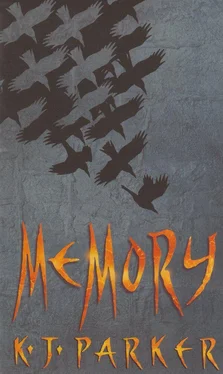K Parker - Memory
Здесь есть возможность читать онлайн «K Parker - Memory» весь текст электронной книги совершенно бесплатно (целиком полную версию без сокращений). В некоторых случаях можно слушать аудио, скачать через торрент в формате fb2 и присутствует краткое содержание. Жанр: Фэнтези, на английском языке. Описание произведения, (предисловие) а так же отзывы посетителей доступны на портале библиотеки ЛибКат.
- Название:Memory
- Автор:
- Жанр:
- Год:неизвестен
- ISBN:нет данных
- Рейтинг книги:5 / 5. Голосов: 1
-
Избранное:Добавить в избранное
- Отзывы:
-
Ваша оценка:
- 100
- 1
- 2
- 3
- 4
- 5
Memory: краткое содержание, описание и аннотация
Предлагаем к чтению аннотацию, описание, краткое содержание или предисловие (зависит от того, что написал сам автор книги «Memory»). Если вы не нашли необходимую информацию о книге — напишите в комментариях, мы постараемся отыскать её.
Memory — читать онлайн бесплатно полную книгу (весь текст) целиком
Ниже представлен текст книги, разбитый по страницам. Система сохранения места последней прочитанной страницы, позволяет с удобством читать онлайн бесплатно книгу «Memory», без необходимости каждый раз заново искать на чём Вы остановились. Поставьте закладку, и сможете в любой момент перейти на страницу, на которой закончили чтение.
Интервал:
Закладка:
Cleapho looked up at Tazencius. 'Well? How about it?'
Tazencius nodded, and made some sort of signal to someone or other in the background. After a brief interval during which nothing much happened, eight men in overstated livery brought in two large wooden frames (like window frames without glass or parchment). Inside each frame a human being was stretched like a curing hide, hands and feet pulled tight into the corners. One of them was a woman, and she looked familiar, although it was hard to make out the details of her face through the bruises and dried blood. The other was a man, in even worse shape; and on the top edge of his frame someone had written, in neat gilt letters, 'The Mad Monk.' They were both naked and dirty and thin, with raw ulcers and sores on their ribs and shins. Their heads had recently been shaved, and their eyes and mouths were red and swollen.
The men in livery manoeuvred the frames up onto a raised dais on the right-hand side of the room-they dropped the woman, which caused a great deal of mirth, particularly on the top table-and someone passed ropes over hooks in the ceiling beam. From these they hung the frames, securing them at the bottom with more ropes passed through rings set in the floor. The presence of these specialised fixtures suggested that performances of this sort, whatever it might turn out to be, were a regular event.
Once they'd finished fastening the ropes, the servants got out of the way in a great hurry; which turned out to be a sensible move on their part, because the company around the table were busily arming themselves with missiles of every sort, from soft fruit to the chunkily vulgar wine-cups. The barrage they let fly was more vigorous than accurate. Most of their projectiles banged and splatted against the wall rather than the poor devils in the frames; but such was the volume of shot that inevitably a proportion found their mark. Poldarn saw the man's head knocked sideways by a goblet, splattering the wall behind with wine or blood or both. Two of the men in the middle of the table were having a contest, to see who could be the first to land a napkin ring on one of the woman's breasts. Other diners were throwing spoons and knives.
It wasn't long before the table was stripped bare. The ebony crow had been the last missile to fly; it had been claimed by a tall thin man with a very long beard, who took a long time over his aim and managed to catch the woman square in the ribs with considerable force. The thin man got a good round of applause for that.
After the last missile had been thrown there was a general round of cheering, mixed with shouts for more wine (and more cups). When these basic needs had been provided for by the impressively efficient table-servants, one of the men down the far end of the table called out, 'Get on with it!' Everybody laughed and cheered, and two men appeared from the direction from which they'd brought the frames in. They were clearly very serious men indeed; they were dressed in military uniforms, with gleaming black boots and white pipeclay belts, immaculate red tunics and breastplates that hurt the eyes, especially after a drink or two. One of them was carrying a long stick like a broom handle, and the other a long knife with a curved thin blade.
The man with the knife stopped, right-wheeled, threw Tazencius a crisp salute and said, 'By your leave, sir.'
'Carry on, sergeant,' Tazencius replied. If anything, he looked slightly bored.
The sergeant turned to the man stretched in the frame and wiped a section of his midriff clean of fruit pulp and wine dregs. Then he pinched a fold of skin near the solar plexus and carefully inserted the point of the knife, working it in with the skill and concentration of a high-class surgeon. Once he'd made his incision he pushed the knife in an inch or so-he was taking care not to puncture any of 'the internal organs-and drew down in a straight line, slitting the skin like a hunter paunching a hare. He tucked the knife into his belt without looking down, then pushed his two forefingers into the incision and gently drew the skin apart to reveal the intestines. His skill and delicacy of touch earned him a round of applause from the diners that actually drowned out the noises the man was making; it was hard to see how the sergeant could keep his mind on his work with such a terrible racket going on, but apparently he was used to it, because he didn't seem to be taking any notice. Retrieving his knife from his belt, he hooked a strand of the stretched man's gut round his finger and snipped through it. Then he nodded his head and the other soldier handed him the stick, around which he started to wind the severed gut.
The man was, of course, still alive; and Cleapho, who'd looked away for some reason, suddenly jumped up and called out, 'Fat lot of good your faith's doing you, Earwig. Your god's right here, look, and he's just sitting there. Why don't you ask him-?'
The man turned his head-following the sound of the voice, his eyes were both useless. 'Don't be silly, Cordo,' he said in a weak, pleasant voice, 'he's not that sort of god. You of all people should know that.' Then his face contorted into a shape Poldarn had never seen before, and his chin dropped on his chest. The sergeant had pulled out his heart. He put it down on the nearest table, shaking his fingers to flick off the blood. Cleapho sat down again; his face was white and drawn, his eyes were very wide. He reached for his wine-cup but knocked it over.
The sergeant was standing in front of the woman, his knife in his right hand, his left fingers delicately probing for the right place, like a tentative lover. Copis, Poldarn thought. He knew without having to look that Lysalis's eyes were fixed on him, waiting to see what he was going to do; Tazencius too, inevitably. Even if I wanted to save her, I couldn't, he lied to himself-he knew it was a lie, because a servant, quiet and unobtrusive as light seeping through a crack, had just put something down on the table in front of him, and it wasn't a bowl of soup or a warm flannel-it was a sword, one sword in particular, the only one he could remember having made for himself.
Nicely done, he realised. Lysalis knew that he knew that if he wanted to (Deymeson-trained, top of his year at swordfighting), with a backsabre in his hands he could rescue Copis, in spite of the guards and the Amathy house officers; he could carve a way out if he favoured the direct approach, or he could grab Lysalis or maybe even Tazencius himself as a hostage-There were only maybe a dozen people in the Empire who could realistically expect to manage such a feat of arms (a few moments ago there had been thirteen, but one of them had since died) but it was possible. Under other circumstances, it would constitute a justifiable risk. Therefore, since it was possible, everything turned on whether he wanted to do it or not; and he had a fraction of a second, a heartbeat, in which to make his decision-he'd choose on instinct alone, and therefore his choice would be irreproachably honest. She'd have a true answer to her question, after all.
Copis. The sergeant found his place and pinched a little flap of skin.
What the hell, Poldarn thought, and vaulted over the table, scattering silverware and fruit with his heels. He didn't want to kill the sergeant but there was no time not to. The poor fool hit the floor with his head hanging by a thin strap of sinew, by which time two guards were crowding Poldarn's circle and three more men were treading on their heels. Curiously enough, as he executed the manoeuvre (three enemies, north, east and west; back and sideways with the right foot as you draw, cutting East across the face; swivel round for an overhead cut to West's neck; as you do so, begin the forward step into North's circle, an overhead downward cut splitting his skull; the impetus will bring you round naturally to finish East in the usual way) he could hear a dry, thin voice in his mind calling him through each stage-Father Tutor, presumably, though the voice didn't sound familiar. The other guard, and the fool of a nobleman who tried to stab him in the back with a carving knife, were as straightforward as splitting logs; getting Copis out of the frame, on the other hand, was a bitch.
Читать дальшеИнтервал:
Закладка:
Похожие книги на «Memory»
Представляем Вашему вниманию похожие книги на «Memory» списком для выбора. Мы отобрали схожую по названию и смыслу литературу в надежде предоставить читателям больше вариантов отыскать новые, интересные, ещё непрочитанные произведения.
Обсуждение, отзывы о книге «Memory» и просто собственные мнения читателей. Оставьте ваши комментарии, напишите, что Вы думаете о произведении, его смысле или главных героях. Укажите что конкретно понравилось, а что нет, и почему Вы так считаете.












